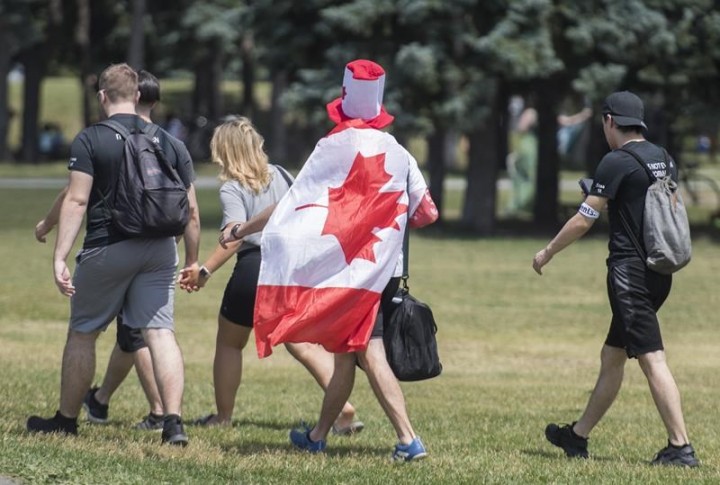MONTREAL — Canada Day celebrations are making a return after two years of scaled-down festivities because of the COVID-19 pandemic, but some Canadians hoping to catch a traditional parade may be out of luck.
Several cities say the rising cost of security and insurance, in addition to troubles securing funding, is forcing them to rethink their celebrations.
In Montreal, there will be no Canada Day parade for the third year running, and this time COVID-19 is only partly to blame.
Organizer Nicholas Cowen says that while the novel coronavirus is a major concern, the federal Heritage Department offered less funding in a year when inflation is at its highest level in decades.
“The parade receives a grant so it is very much like receiving a check for the same amount every year,” he wrote in an email. “This year the funding was to go back to 2015 levels at 2022 prices.”
The parade’s executive director, Caroline Polcsak, explained in an interview that the price of insurance has increased along with almost everything else — down to the ingredients of the large, traditional cake that is served to the public. She said corporate sponsors are hard to get because parades cannot offer tax receipts.
“For the parade, this means less money, higher prices,” Cowen wrote.
Instead, Canada Day celebrations in Montreal will take place at the Old Port, where events will include face painting, games, cake and a concert.
Heritage Canada did not respond to a request for comment on Tuesday.
Montreal is not the only city where Canada Day organizers are blaming the rising cost of insurance and security for cancelled parades.
In Strathcona County, Alta., the Sherwood Park and District Chamber of Commerce announced in May that the Canada Day parade would not take place.
“Unfortunately, our success coupled with the many recent incidents at other parades in Canada and the United States has significantly increased the risks associated with parades and the onus on the event organizers,” executive director Todd Banks wrote in a message.
Banks said, “The costs of physical infrastructure, insurance and security obligations have now grown beyond our capabilities when considering all the monetary and volunteer requirements.”
Last year, six people were killed and dozens injured after a man is alleged to have deliberately driven his SUV into a Christmas parade in Waukesha, Wis. And in Toronto in 2019, four people were injured after shots rang out at a parade celebrating the Raptors’ NBA championship win.
The Vancouver Fraser Port Authority, which cancelled that city’s Canada Day parade in 2018 over rising prices, announced this year it would neither host a parade nor present a fireworks display, citing “rising costs for safety and security, and across the events industry,” adding that it would instead focus on other events.
Banff, Alta., made the decision to replace its parade with a day of activities and performances.
On its website, the city mentioned several factors for replacing its parade: a desire for less crowding during the pandemic; the advantage of being able to offer performers staggered time slots; a reduction in the use of fossil fuel-powered vehicles; and staffing challenges that have “affected the town’s ability to move all barriers and planters for a one-hour event.”
Last year, many cities opted to cancel Canada Day events after the discovery of unmarked graves at sites of former residential schools. While most events are resuming this year, some cities, such as Winnipeg and Thunder Bay, have chosen to observe Canada Day with cultural programming rather than celebratory events such as parades and fireworks.
The cancellation of Montreal’s parade came months after the death of Roopnarine Singh, a Trinidad-born doctor who organized the city’s first Canada Day parade in 1978 with just a handful of vehicles after being dismayed there was no celebration to mark his adopted country’s birthday.
In an interview in 2017, Singh recalled years of fighting to secure funding for the event, occasionally becoming a thorn in the side of political leaders who didn’t want to anger the province’s separatist faction in the years surrounding the two referendums.
Cowen said Singh, who died in March, had hoped to be in Montreal this summer for the parade. Polcsak said he undoubtedly would have been “upset” to see the event he fought for so hard cancelled.
Both organizers say they’re working hard to secure the funding they need to bring back the parade next year.
This report by The Canadian Press was first published June 29, 2022.
Morgan Lowrie, The Canadian Press
